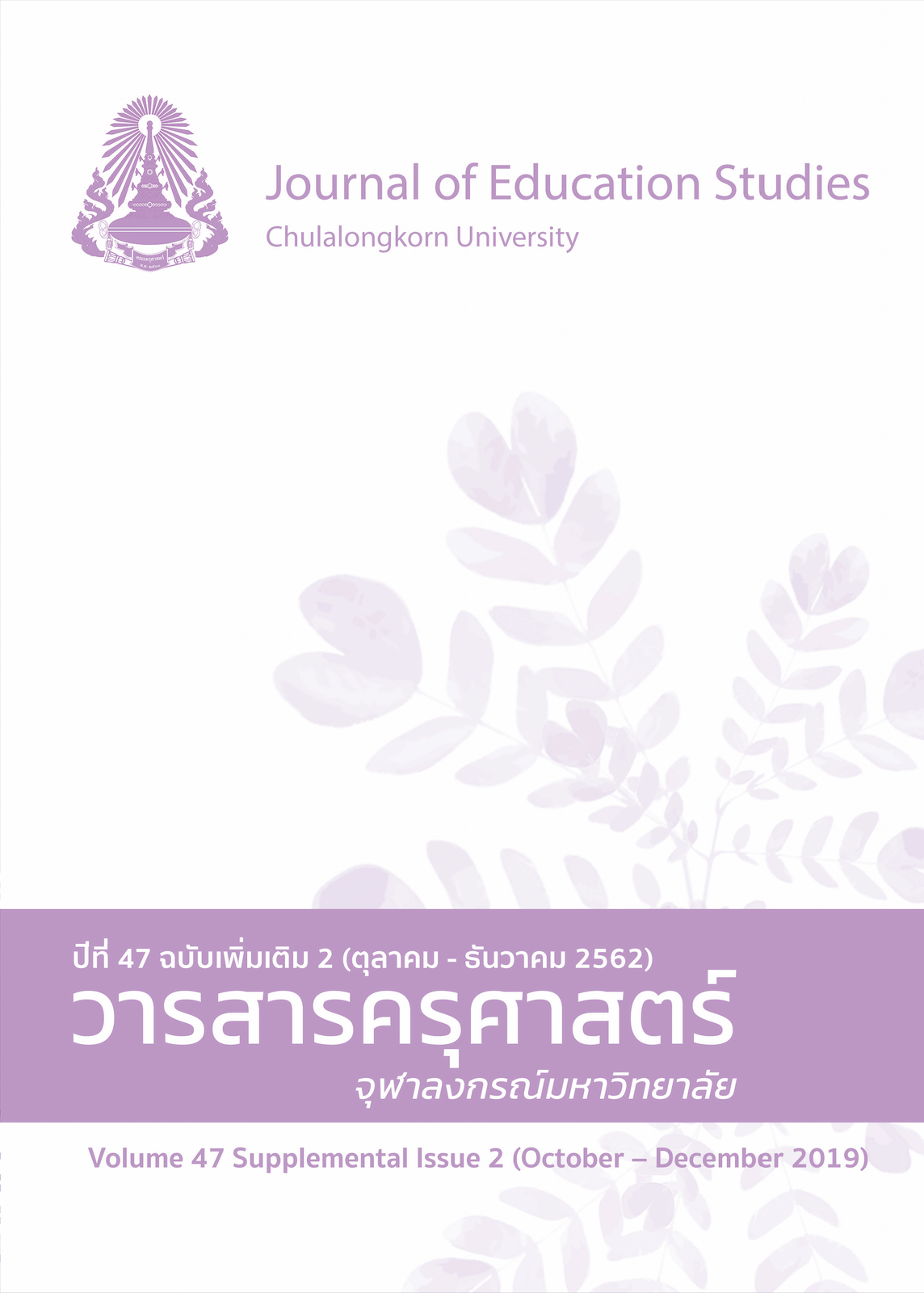Young Children as Digital Citizens: Opportunity or Risk
Keywords:
YOUNG CHILDREN, DIGITAL CITIZENS, OPPORTUNITY, RISKAbstract
Young children are in the stage of rapid human development. In this era continuously driven by the information technology, young children need to possess the 21st Century skills which provide them with the opportunity for growing up as digital citizens who are capable of seeing through tricks of the media that cover several diversified dimensions of technological changes. This particular paper features the elements regarding Thai children’s current trends in digital media usage behaviors, the value of being digital citizens as well as the factors and risks related to the digital era influencing their growth and development. This includes providing young children with opportunities for being developed as digital citizens, through the underlying mechanisms which drive them to acquire digital citizenship skills, i.e. parents and early childhood teachers who act as their role models and possess cooperation skills which promote the suitable learning environment for development and learning of young children. Such factors can lead to reduction of the risks which may occur to the children and further develop their digital citizenship skills which are collectively called “Digital Intelligence”.
References
กรมสุขภาพจิต. (2562). ไม่ร้ายแรง แต่เรื้อรัง สมาธิสั้น ภัยเงียบสำคัญในยุคสื่อใหม่. สืบค้นจาก https://www.dmh.go.th/news-dmh/view.asp?id=29866
ชนิพรรณ จาติเสถียร, กันตวรรณ มีสมสาร, และอภิรดี ไชยกาล. (2560). การใช้สื่อเทคโนโลยีสำหรับเด็กปฐมวัย. กรุงเทพมหานคร: สมาคมอนุบาลศึกษาแห่งประเทศไทยในพระบรมราชูปถัมภ์พระบาทสมเด็จพระเทพรัตน์ราชสุดาสยามบรมราชกุมารี.
ถิรนันท์ อนวัชศิริวงศ์ และ พิรุณ อนวัชศิริวงศ์. (2561). MIDL for Kids การรู้เท่าทันสื่อ สารสนเทศ และดิจิทัลสำหรับเด็กปฐมวัย. กรุงเทพมหานคร: สุพีเรียพริ๊นติ้งเฮ้าส์.
นิพนธ์ ชาญอัมพร และ ธาตรี ใต้ฟ้าพูล. (2558). รูปแบบการดำเนินชีวิตและความคิดเห็นต่อรายการโทรทัศน์ของเด็กเจเนอเรชั่นแซด. วารสารประกอบการประชาสัมพันธ์และโฆษณา, 8(2), 73-92.
แพรวพรรณ สุริวงศ์. (2558). สร้างสมองลูก สู่ยุคดิจิตอล. สืบค้นจาก www.thaihealth.or.th/Content/ 27584-สร้างสมองลูก%20สู่ยุคดิจิตอล.html
ภัทริกา วงศ์นันต์นนท์. (2557). พฤติกรรมการใช้อินเทอร์เน็ตของเด็กและเยาวชน. วารสารพยาบาลทหารบก, 15(2), 173-178.
มัณฑนา ชลานันต์. (2561). ลูกของคุณเสี่ยงมีพฤติกรรมคล้ายออทิสติกหรือไม่. สืบค้นจาก https://www.bangkokhospital.com/th/disease-treatment/child-risk-autism
วรนาท รักสกุลไทย, ปนัดดา ธนเศรษฐกร, ธิดา พิทักษ์สินกุล, วิวรรณ สารกิจปรีชา, กรองทอง บุญประคอง, อัญจลา จารุมิลินท, … สลิลดา ทศานนท์. (2561). การพัฒนาทักษะสมอง EF ด้วยการ “ให้โอกาส”. ใน สุภาวดี หาญเมธี, ธิดา พิทักษ์สินสุข และภาวนา อร่ามฤทธิ์ (บ.ก.), คู่มือพัฒนาทักษะสมอง EF Executive Function สำหรับครูปฐมวัย (น. 96-113). กรุงเทพมหานคร: เอกพิมพ์ไทย.
วรพจน์ วงศ์กิจรุ่งเรือง. (2561). คู่มือพลเมืองดิจิทัล. กรุงเทพมหานคร: ดิ วันโอวัน เปอร์เซนต์.
สถาบันรามจิตติ. (2552). รายงานสภาวการณ์เด็กและเยาวชน ปี 2551-2552. กรุงเทพมหานคร: โรงพิมพ์แห่งจุฬาลงกรณ์มหาวิทยาลัย.
สรวงมณฑ์ สิทธิสมาน. (2560). การบริหารจัดการสื่อดิจิทัลเพื่อเด็กปฐมวัย. (วิทยานิพนธ์ปริญญาดุษฎีบัณฑิต) สืบค้นจาก http://ithesis-ir.su.ac.th/dspace/bitstream/123456789/1525/1/592 52928.pdf
สุภาวดี เจริญวานิช. (2557). พฤติกรรมการติดเกม: ผลกระทบและการป้องกัน. วารสารวิทยาศาสตร์และเทคโนโลยี, 22(6), 871-879.
สุภาวดี หาญเมธี. (2561). รู้จักทักษะสมอง EF. ใน สุภาวดี หาญเมธี, ธิดา พิทักษ์สินสุข และภาวนา
อร่ามฤทธิ์ (บ.ก.), คู่มือพัฒนาทักษะสมอง EF Executive Function สำหรับครูปฐมวัย (น. 28-58). กรุงเทพมหานคร: เอกพิมพ์ไทย.
สำนักงานกองทุนสนับสนุนการสร้างเสริมสุขภาพ. (2557). ใช้'คอมฯ-สมาร์ตโฟน'นานทำสายตาสั้น. สืบค้นจาก https://www.thaihealth.or.th/Content/26066-ใช้'คอมฯ-สมาร์ตโฟน'นานทำสายตาสั้น.html
สำนักงานสถิติแห่งชาติ. (2561). สรุปผลที่สำคัญการสำรวจการมีการใช้เทคโนโลยีสารสนเทศและการสื่อสารในครัวเรือน พ.ศ.2561 (ไตรมาส 1). กรุงเทพมหานคร: สำนักงานสถิติแห่งชาติ.
โสภิดา วีรกุลเทวัญ. (2561). เท่าทันสื่อ: อำนาจในมือพลเมืองดิจิทัล. กรุงเทพมหานคร: สถาบันสื่อเด็กและเยาวชน.
อภิรพี เศรษฐรักษ์ ตันเจริญวงศ์, ศรีรัฐ ภักดีรณชิต, และญาณวุฒิ เศวตธิติกุล. (2561). พฤติกรรมการใช้หน้าจอของเด็กไทยวัย 0-3 ปี ในเขตกรุงเทพมหานคร. วารสารวิชาการนวัตกรรมสื่อสารสังคม, 6(2), 60-69.
ภาษาอังกฤษ
DQ Institute. (2017). Digital intelligence (DQ) A conceptual framework & methodology for teaching and measuring digital citizenship. Singapore: DQ Institute.
Federal Trade Commission. (1998). How to comply with the children’s online privacy protection rule. Retrieved from https://www.ftc.gov/enforcement/rules/rulemaking-regulatory-reform-proceedings/childrens-online-privacy-protection-rule
Frejd, S.H. (2014). The Rise of Digital Dementia: Protecting Yourself and your Clients. Retrieved from http://www.acacc.net/2013/10/18/the-rise-of-digital-dementia-protecting-yourself-and-yourclients/
Instagram, Inc. (2019). Terms of Use (Instagram). Retrieved from https://help.instagram.com/ 478745558852511
National Association for the Education of Young Children. (2012). Technology and interactive media as tools in early childhood programs serving children from birth through age 8. Washington DC: Fred Rogers Center for early learning and children’s media.
Rogow, F. (2002). ABCs of media literacy: What can pre-schooolers Learn?. Retrieved from www.medialit.org/reading-room/abcs-media-literacy-what-can-pre-schooolers-learn
Zimmerman, F. J., Christakis, D. A., & Meltzoff, A. N. (2007). Television and DVD/video viewing in children younger than 2 years. Arch Pediatr Adolesc Med, 161(5): 473-479.




